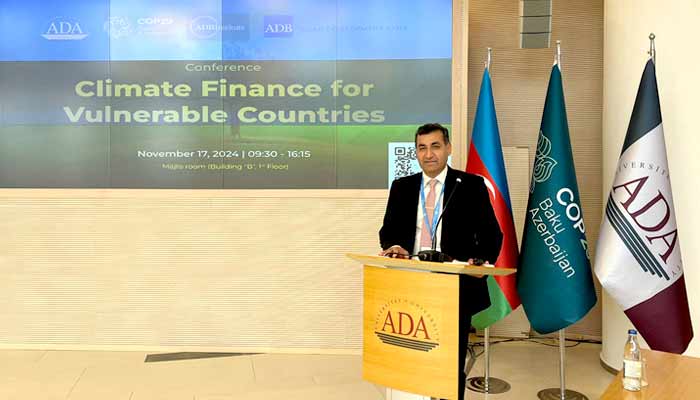By Muhammad Sarwar, Energy Expert and Sustainability Advocate
The international community, often described as the comity of nations, has long relied on the United Nations (UN) as a platform for addressing global crises. Whether in times of war, natural disasters, or humanitarian emergencies, the UN remains a symbol of collective hope. Among its key initiatives is the United Nations Framework Convention on Climate Change (UNFCCC), established to unite the world in combating the severe impacts of climate change—an existential threat caused by environmental degradation and global warming.
Since its inception in 1995, the annual Conferences of the Parties (COPs) under the UNFCCC have served as the primary forums for global climate negotiations. These gatherings aim to bring nations together to align on strategies for mitigating greenhouse gas emissions and adapting to the realities of a warming planet.
The recently concluded COP29 in Baku, Azerbaijan, carried forward this tradition with a renewed sense of urgency. However, it also highlighted the deep divide between developed and developing nations. While vulnerable countries continue to bear the brunt of climate impacts, they are left waiting for meaningful action from the developed world—the historical drivers of climate change.

Controversial Hosts and Fossil Fuel Dependency
Azerbaijan, a major petrochemical producer, faced criticism for hosting COP29. This echoed the concerns raised during COP28 in the UAE, another fossil fuel-dependent economy. Critics questioned whether nations reliant on oil and gas revenues could lead discussions on phasing out these very resources. The core goal of limiting global temperature rise to 1.5°C remains elusive, and such contradictions further complicate global efforts.
Missed Opportunities by G20 Nations
A key disappointment at COP29 was the insufficient engagement of the G20 countries, which collectively account for the majority of global greenhouse gas emissions. Despite growing evidence of climate emergencies—2024 being projected as the hottest year in recorded history—the world’s largest economies prioritized politics over action.
COP29 President Mukhtar Babayev, in a mid-conference press briefing, criticized the lack of financial commitments from developed nations. He remarked, “Politicians have the power to drive this process forward. It is time for courage and leadership. Without active participation from G20 countries, global climate efforts will remain insufficient.”
The Climate Finance Shortfall
One of the most contentious issues was the funding gap for climate adaptation and mitigation in vulnerable nations. Despite calls for a $1.3 trillion climate finance package, only $300 billion has been pledged by 2035—a stark reminder of the limited progress.
Simon Stiell, the UNFCCC Executive Secretary, emphasized that climate finance must be viewed as a critical investment, not charity. He pointed to progress in areas like carbon markets but stressed the need for faster action. He stated, “The finance package must meet current needs and lay the foundation for future resilience.”
Even UN Secretary-General António Guterres expressed disappointment with the limited ambition of COP29. While acknowledging the agreement as a baseline, he reiterated that much more needs to be done to address the growing climate crisis.
Buzzwords vs. Real Action
A troubling trend at COP meetings is the focus on new buzzwords—such as net zero, carbon capture, and loss and damage—without delivering tangible results. Many delegates from least-developed countries struggle to navigate the technical jargon, which hinders their ability to push wealthier nations for stronger commitments.
Negotiations on the New Collective Quantified Goals on Climate Finance (NCQG) extended 48 hours past the deadline, reflecting the habitual delays at COPs. Despite prolonged discussions, the outcomes rarely meet the expectations of the most vulnerable nations.
The Stark Reality for Vulnerable Nations
Countries like Pakistan, which face recurring climate catastrophes, remain at the forefront of climate vulnerability. A single extreme weather event in Pakistan can affect a population equal to that of three Scandinavian nations combined, causing billions of dollars in economic losses. Yet, the plight of such nations often goes unheard, as wealthier nations fail to fulfill their promises of financial and technical support.
The Road Ahead for the UNFCCC
The UNFCCC must rethink its approach to negotiations. While the framework has achieved some successes, the lack of political will, consensus, and timely action continues to undermine its credibility. Issues like climate finance and the Loss and Damage Fund remain unresolved, leaving vulnerable nations to suffer the consequences of a crisis they did not create.
Without stronger commitments—especially from developed nations—the global response to climate change risks falling dangerously short of what is needed. COP29 may have provided a platform for dialogue, but the time for promises has passed. It is now time for real, decisive action to secure a sustainable future for all.
Muhammad Sarwar is an energy expert and sustainability advocate with years of experience analyzing global climate policies and their impact on vulnerable regions.
